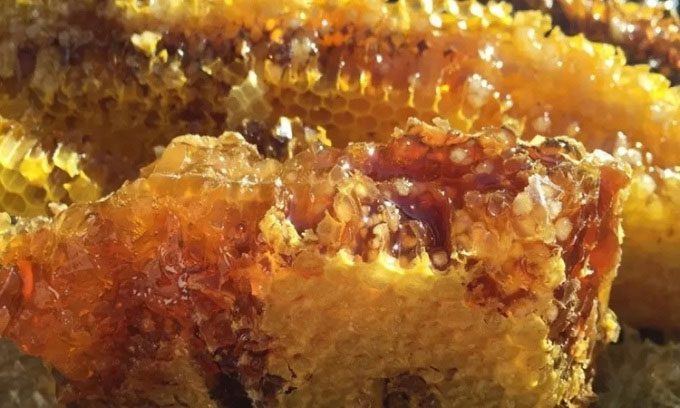In one of the boldest ambushes in history, a Roman army fell victim to an enemy that poisoned them with hallucinogenic honey from bees living along the Black Sea.

Hallucinogenic honey produced by bees that feed on rhododendron nectar. (Photo: Interesting Engineering).
Hallucinogenic honey caused the unfortunate Roman soldiers who consumed it to experience numerous unpleasant symptoms in a short period and lose their combat effectiveness. The massacre occurred during the Third Mithridatic War, a time when the Roman army was expanding its empire across Anatolia from 73 to 63 BC. During this campaign, they encountered one of their most formidable foes, King Mithridates VI of Pontus, also known as the King of Poisons.
Mithridates became obsessed with poison after his father was assassinated by unknown assailants at a royal banquet. Renowned for his intelligence and passion for pharmacology, Mithridates cultivated immunity to several types of poison by consuming small doses daily. As the Romans advanced, Mithridates’ soldiers attacked the invaders with poisoned arrows, released wasps and various other insects into the besieged Roman tunnels, and even developed chemical weapons from petroleum.
Describing an event that occurred in 65 BC, the ancient historian Strabo noted that Mithridates’ ally, the Heptacomitae tribe, used hallucinogenic honey to defeat a Roman army. Produced by bees that fed on rhododendron nectar, this honey contained high levels of the neurotoxin grayanotoxin, which can induce hallucinations, loss of motor coordination, vomiting in small amounts, and severe heart complications in larger doses. According to Strabo, the Heptacomitae placed bowls of honey along the route of the Roman army. When the soldiers consumed the honey and lost their senses, the Heptacomitae would attack and easily eliminate their enemies.
Combining historical records about the event with a study published on April 29 in the journal Cureus, a research team led by Matthew D. Turner at the Madigan Army Medical Center explained that this was not the first instance of an ancient army being poisoned with hallucinogenic honey. Three centuries earlier, the Greek commander Xenophon described how hundreds of his soldiers behaved strangely for a time, experiencing vomiting, diarrhea, and a complete loss of balance. Despite the severe poisoning, no soldiers died. All regained their awareness and senses within 24 hours after consuming the honey.
In fact, grayanotoxin poisoning is rarely fatal as the toxin is quickly metabolized by the body. However, by accurately timing their attack to catch the Roman soldiers under the influence of hallucinogenic honey, the Heptacomitae tribe was able to easily obliterate their enemies. Nevertheless, this minor victory did not help Mithridates turn the tide of the war, and the Pontic kingdom was ultimately destroyed by the Roman army.


















































